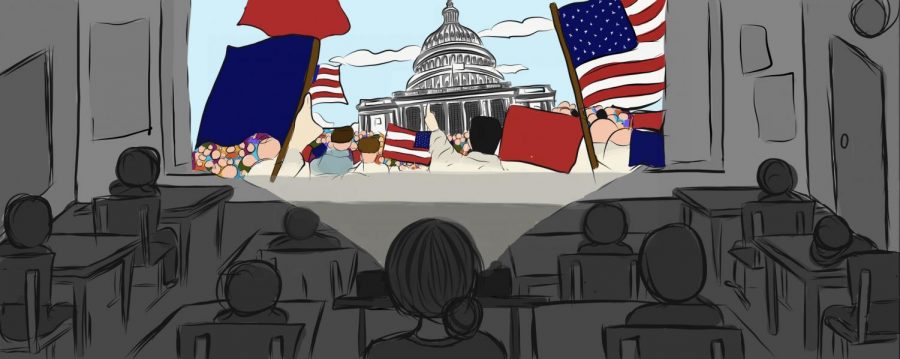Political events prompt class discussions
February 12, 2021
The Washington Post reported that the 2020 Presidential Election voter turnout, over 66 percent of the U.S. voting population, was the highest in over a century. From news channels to social media, politics has found a way to be integrated in Americans’ lives, including in the classrooms at South. Teachers, however, are barred from engaging in political activity while working because they are public employees, Principal Dr. Lauren Fagel explained. Because educators are in positions of power, Fagel said she agrees with Illinois law.
“I agree that as public employees, we shouldn’t be able [to engage in political activity],” Fagel said. “Especially in education, we are in positions of authority and it puts people in an awkward position.”
While Fagel believes teachers should remain unbiased, she does encourage them to ask how their students are feeling when major events occur.
“Teaching students how to have conversations about difficult topics even if they disagree is more important to me than staying silent,” Fagel said.
Similarly, English Teacher Jen Jun expressed that since students are living through history, discussions are valuable. Jun has incorporated current events in her classroom by sharing videos of Amanda Gorman’s Inauguration Day poem, “The Hill We Climb.” While she incorporates current events, she thinks that GBS needs to welcome all voices.
“I think South creates safe spaces for kids that are naturally comfortable sharing, however, we have a long way to go before the conversations include voices of those who aren’t always heard,” Jun expressed.
Micheal Vodicka, Political Discussions Club sponsor, said the Political Discussions Club is a place where all students can safely discuss topics.
“The club members vote on a topic, or if there is something a member really wants to discuss we work it into the discussion,” Vodicka said. “A lot of these topics can be emotional, and can cause tension, but we all agree to be civil. It’s my goal as a sponsor to offer a free and open platform for debate.”
However, senior William Hurley explained that he did not feel comfortable as when one of his teachers discussed the events that happened at the U.S. Capitol, with a bias.
“My teacher started the class with him monologuing for nine minutes about why discussing this matters,” Hurley said. “He spoke with an open left bias.”
Hurley believes that politics should not be discussed in class. He was initially hesitant to speak up, as he was unsure if he would face consequences for sharing his beliefs.
“I ended up sharing it anyway because I cannot take this open liberal bias in our classrooms lying down, but I was extremely uncomfortable,” Hurley said. “By my teacher openly expressing his strong liberal opinions I, along with many of my friends, felt that we would be punished for our conservative opinions, which is becoming a common theme at GBS.”
Although sophomore Drew Duffy believes that as a liberal student at South he shares similar beliefs with some of his teachers, he does not, however, think that his teachers are biased against other students’ beliefs. Duffy explained his teachers have held debates from an intellectual perspective on topics ranging from gun control to foreign policy.
“I feel no extra support for my standpoints,” Duffy said. “I’ve heard teachers being called biased for reading out of a textbook and showing a news video. Having contentious conversations is valuable to everyone’s education.”
English Teacher Dayna Cottrell, has incorporated discussions, including the attack on the Capitol in her class. Cottrell saw it as an opportunity for students to formulate and listen to other opinions.
“Students were curious about what was happening, as they were at school as the events unfolded,” Cottrell stated. “I think initially students had a lot of questions about what was going on, so as a class, we did our best to piece together the facts and what we knew at that time.”
AP Government Teacher David Kane is willing to discuss current events when students show interest, however, he focuses on discussing current events when they naturally integrate into the curriculum. Kane has his students complete a presentation in which they present a current event to the class and the other students are encouraged to bring up opposing viewpoints. If no opposing viewpoints are brought up, Kane will provide them.
“I try to take on the opposing role myself regardless of whether I agree or disagree,” Kane said. “It is important to have strong passions on topics while understanding that others may have a different perspective.”
While Kane is encouraged to see that students are politically active, he believes that students have become more polarized as a result.
“[Students] are more willing to ostracize a student that doesn’t agree with their point of view,” Kane said. “They only see the other point of view as extreme and never their own. It is critical to learn that just because someone doesn’t agree with your views doesn’t make that person evil or contemptible.”



